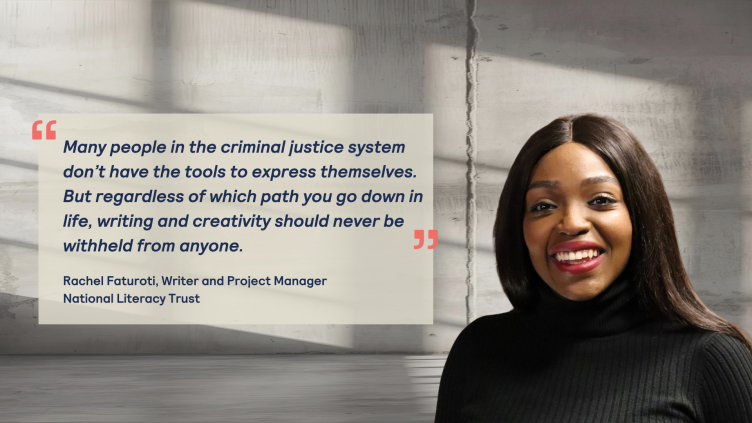How writing poetry can give voice to the criminal justice system's forgotten community

Too often voices are left unheard.
In this powerful interview, author and New Chapters Project Manager Rachel Faturoti shares her belief that literacy is a universal right, especially for those within the criminal justice system.
Creating space to find and share voices - whatever your story
The New Chapters anthology is the tangible culmination of our New Chapters workshops which take place with young people who are serving custodial sentences. The programme, part of our wider Criminal Justice activity, equips and empowers these young people in prison and young offender institutions to find, and crucially, share their voice through poetry and writing for pleasure; developing their creativity as well as their vital literacy skills. The subsequent anthology therefore celebrates their creative writing, showcasing extraordinary talent and emotional depth. Each contributor receives copies of their published work, and the anthology is shared across every prison library, inviting readers to send feedback directly to the writers.
It’s a moving reminder that poetry is available as a lifeline for everyone: offering dignity, connection, and freedom of expression in places where freedom is otherwise denied.

Stepping into a prison for the first time, Rachel Faturoti was immediately struck by the harsh reality. “It’s like a forgotten community,’’ she observed. “You think you know what prison is going to be like from the media, but having seen it in person, it’s much worse than I thought.’’
What hit hardest was the invisibility. Life behind bars often means life without a voice. Many people lack the literacy skills to express themselves, and society tends to silence them further: “Some people believe that once you’re in prison, you’re hidden away not to be seen or heard, but that’s not how life works’’.
Rachel Faturoti is an author for young adults and is a Project Manager for our New Chapters programme which supports people in custody through creative writing workshops, free books, and opportunities to share their poetry in anthologies and on National Prison Radio.
Rachel started writing because stories were her first escape, and now she offers that same gift to others. From experimenting with “terrible short stories” on her dad’s typewriter to publishing books that explore grief, homelessness, disability and environmental issues, writing has always been a way for her to process the world:
“The main thing I love about writing is that you get to escape into a different world… I hope that my books can transport people or help people even deal with different things in life.”
New Chapters: Creativity in confinement
Through New Chapters, Rachel supports participants to use writing as a tool to navigate life’s challenges and find escapism in a confined world. Participants work with authors – often with lived experience of the criminal justice system – to find their voice and, most importantly, cultivate the language and skills to learn how to use it:
‘’There are individuals who want to express themselves, but they don’t have the right language and tools to do so. Through New Chapters workshops, they discover the freedom to write, think and feel in their own way.”
Rachel emphasises that the built environment of a prison inhibits creativity, stripping people of their identity and opportunities. Restrictive cells, rigid routines and systemic control all work against self-expression. All of this informs Rachel’s belief that literacy is a universal right that cannot be withheld.
The New Chapters anthology offers a rare glimpse into the minds of those often unheard, where creativity is unbound. Through poetry, plays, lyrics, and personal reflections, contributors confront themes of accountability, mental health, masculinity, and hope.
New Chapters is a megaphone for the voiceless
At the National Literacy Trust, we believe literacy is a lifeline. It empowers people to connect, to imagine new possibilities, and to take their place in society.
More than a collection of writing, New Chapters is a megaphone for the voiceless. It reminds us that imagination, especially when nurtured in the darkest places, is the last part of us that remains truly free.
Read the anthology and share your thoughts
If you would like to read and feedback on the work, please email us at criminaljustice@literacytrust.org.uk and quote the code (for example ‘NCAYL5’) which appears in the top right-hand corner of the page to identify the piece(s) you are giving feedback on.
If you have been moved by what you have read, you can find out more about how to support our criminal justice programmes by emailing the team at the email address above.